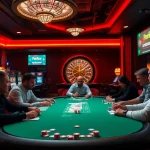Introduction to Decentralized Ownership in Gaming
Decentralized ownership in gaming refers to the use of blockchain 58win technology and decentralized networks to give players true ownership of in-game assets. Unlike traditional gaming models where game companies retain full control over digital items, decentralized systems allow players to trade, sell, or transfer their assets freely. This shift is creating a new era of player empowerment, where control is no longer solely in the hands of developers.
The Concept of Player Empowerment
Player empowerment occurs when gamers have meaningful control 58win login over their experiences and resources within a game. By granting ownership of digital assets, decentralized systems allow players to shape their gameplay journey, make strategic decisions about their assets, and engage in the game economy on their terms. Empowerment strengthens engagement, retention, and overall satisfaction.
How Blockchain Enables True Ownership
Blockchain acts as a public ledger that verifies asset ownership and transactions without relying on a central authority. In gaming, this means items such as skins, weapons, or characters are securely owned by players rather than stored on centralized servers. The transparency of blockchain ensures that ownership is verifiable and transferable, building trust in the gaming ecosystem.
Economic Opportunities for Players
Decentralized ownership opens up new economic avenues. Players can sell, trade, or rent their in-game assets, turning gaming into a potential source of income. Marketplaces built on blockchain networks allow players to monetize their skills and assets, providing financial incentives alongside entertainment. This model also encourages investment in rare or limited-edition items.
Enhancing Interoperability Across Games
Decentralized systems enable assets to move across different games or platforms, creating interoperable ecosystems. Players can carry their assets from one game to another without losing value, expanding the utility of digital items and rewarding long-term commitment. Interoperability also fosters creativity, allowing developers and players to experiment with cross-game experiences.
Empowering Communities and Collaboration
Decentralized ownership strengthens player communities by giving them collective influence. Players can form guilds, participate in decentralized autonomous organizations (DAOs), or vote on game decisions. This collaborative approach ensures that player voices are heard, fostering a sense of shared purpose and ownership over the game’s direction.
Reducing Developer Monopoly
Traditionally, developers control in-game economies and decisions. Decentralized ownership reduces this monopoly, allowing players to participate in governance. Decisions regarding updates, new features, or asset policies can be made collectively, creating a more democratic gaming environment where the community has a tangible impact.
Enhancing Security and Asset Protection
Digital ownership on decentralized networks enhances security. Blockchain’s cryptography prevents unauthorized duplication or theft of assets. Players can safely trade or hold items without fear of them being deleted or seized by the game provider. This security strengthens confidence in the value of digital goods.
Encouraging Creativity and Innovation
Decentralized ownership incentivizes creativity by rewarding players for contributing unique assets. Players can design skins, characters, or items and sell them in the marketplace. This system promotes innovation, as players are motivated to develop content that holds real-world or in-game value.
Challenges and Considerations
While decentralized ownership empowers players, it also introduces challenges. Market volatility, technical barriers, and regulatory uncertainty can impact the value and accessibility of assets. Developers and communities must address these risks to ensure fair and sustainable ecosystems for all participants.
The Future of Player-Centric Gaming
The growth of decentralized ownership signals a shift toward player-centric gaming. Future games are likely to integrate blockchain and decentralized systems more deeply, providing seamless ownership experiences, cross-game interoperability, and robust community governance. Players will increasingly shape the value and evolution of the games they love.
Conclusion: Empowerment Through Ownership
Decentralized ownership fundamentally transforms gaming by giving players real control, economic opportunities, and influence over virtual worlds. By decentralizing power, these systems foster engagement, creativity, and trust. As the gaming industry continues to evolve, player empowerment through ownership will remain a defining feature of the next generation of interactive experiences.
